The U.S. DOJ significantly influences Bitcoin prices through its regulatory actions. For instance, when the DOJ sold $6.5 billion worth of Bitcoin, it triggered immediate market reactions and led to volatility. This illustrates how government interventions can sway investor sentiment, either increasing fear or providing clarity. Favorable actions typically boost prices, while restrictive measures can cause declines. Despite the decentralized nature of Bitcoin, market sentiment remains sensitive to such developments. Staying informed about ongoing DOJ actions is essential to understand potential price movements and how these factors shape overall market dynamics. You'll discover more about this complex interaction shortly.
Key Takeaways
- Large-scale DOJ Bitcoin sales can temporarily destabilize prices, triggering market volatility and investor fear due to uncertainty.
- Historical patterns indicate that the market often stabilizes after initial reactions to government sell-offs, showing resilience.
- Favorable regulatory actions can positively influence Bitcoin prices, while restrictive measures typically lead to declines and increased risk aversion.
- Market sentiment plays a crucial role in how DOJ actions impact Bitcoin, with prevailing feelings dictating investor reactions and price movements.
- Diversification strategies can mitigate risks associated with DOJ actions, helping investors maintain stability in volatile market conditions.
Bitcoin Fundamentals and Terminology
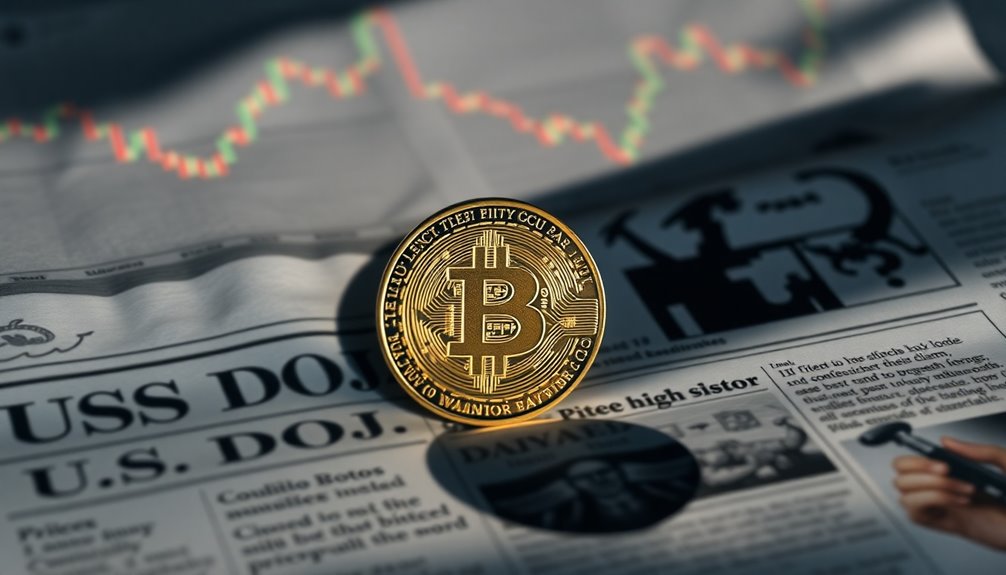
While many may think of Bitcoin as just another form of currency, it's much more than that. Bitcoin is a decentralized digital currency designed to operate independently of any central authority. Each Bitcoin is a digital asset, and the smallest unit is called a Satoshi. This currency relies on blockchain technology, which maintains a transparent public ledger of all transactions. Your Bitcoin wallet contains a public key for receiving funds and a private key for authorizing transactions. The blockchain ensures that every transaction is verified and recorded, reducing fraud risks. With the decentralized network of miners verifying transactions, Bitcoin stands as a secure and innovative form of currency, reshaping how we think about money and value. Moreover, the total supply of Bitcoin is capped at 21 million coins, creating a sense of scarcity that enhances its value proposition. Additionally, its volatility management strategies can significantly affect investor confidence and market dynamics.
Market Sentiment and Regulations
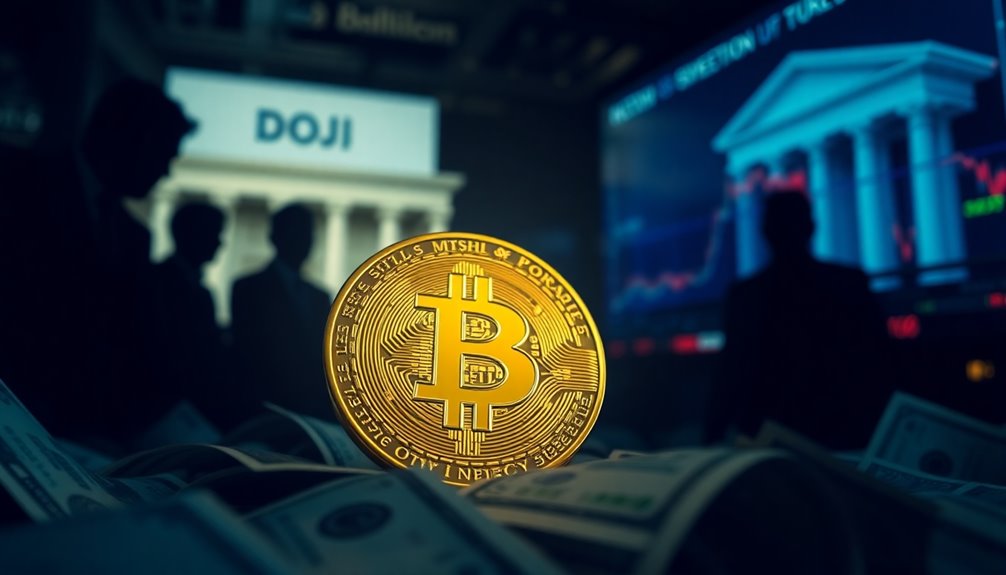
As regulatory actions and market sentiment are closely intertwined, changes in one can significantly influence the other.
When large-scale liquidations, like the DOJ's $6.5 billion Bitcoin sale, occur, they can cause brief market volatility. Initially, you might see a slight dip in Bitcoin's price, but the market usually adjusts quickly, absorbing the impact within a week due to daily volumes around $1 billion. The DOJ's Bitcoin liquidation represents one of the largest cryptocurrency liquidations in history, which may further amplify investor reactions.
Regulatory uncertainties, particularly from the SEC, can heighten investor risk aversion, leading to sell-offs that affect not just Bitcoin but broader markets. Investors often perceive declines in Bitcoin prices as indicators of risk, prompting cautious behavior across financial assets.
Thus, market reactions to regulatory actions are crucial for maintaining stability and confidence.
Mechanisms of Bitcoin Transactions

Understanding the mechanisms of Bitcoin transactions is crucial for anyone looking to navigate the cryptocurrency landscape effectively. When you initiate a transaction, it's broadcasted to nodes on the Bitcoin network for verification. Miners check the transaction data, ensuring it's valid before adding it to a block template. This process relies on a proof-of-work system, where the chain with the most cumulative work is deemed valid. Each participant has public and private key pairs that play a critical role in ensuring the security of the transaction process.
Once miners successfully mine a block, it becomes immutable and is broadcasted across the network. All nodes then update their copies of the blockchain, ensuring consistency. The transactions within that block are considered irreversible, solidifying your ownership and transaction history. This intricate system ensures the integrity and security of each Bitcoin transaction.
Pros and Cons
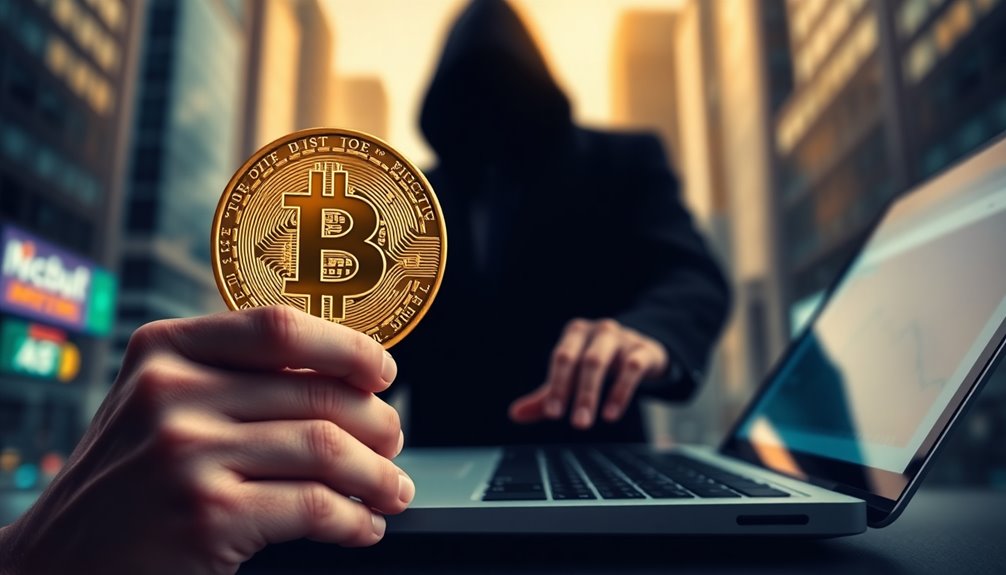
The actions taken by the US DOJ regarding Bitcoin can lead to both positive and negative outcomes for the cryptocurrency market.
On the positive side, historical data shows the market's resilience, often absorbing significant government sales without drastic price drops. Additionally, these actions could reduce speculation, providing clearer market signals and potentially stabilizing prices. However, recent historical sales by governments, such as the German administration's sale, demonstrate that market reactions can vary significantly.
Conversely, large-scale sales might trigger fear among investors, leading to volatility and uncertainty. If the market is in a state of euphoria, sell-offs could cause panic, resulting in sharp price corrections.
Ultimately, the impact of DOJ actions hinges on current market sentiment and dynamics, making it crucial for you to stay informed and cautious in your investment decisions.
Regulatory Effects on Prices
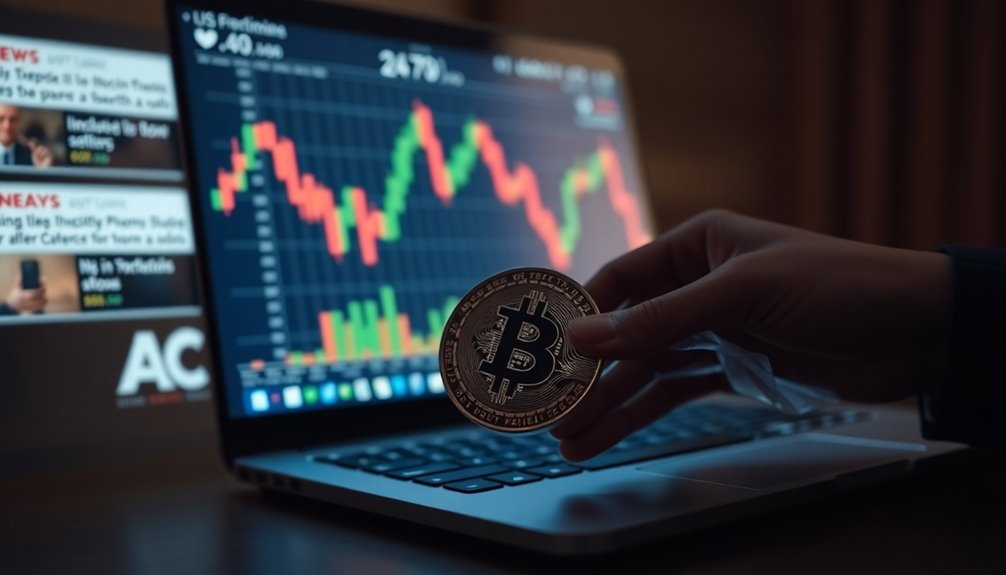
When government actions influence Bitcoin prices, the effects can be both immediate and far-reaching. Historical sales, like the U.S. government's plan to sell 69,370 BTC, often create short-term price corrections due to increased supply. Although past sales didn't always lead to significant drops, the current market sentiment, leaning towards belief and denial, might help absorb some sell-side pressure. Regulatory acceptance plays a crucial role; favorable regulations can drive prices up, while restrictive actions can lead to declines, as seen with China's ICO ban. Ultimately, the decentralized nature of Bitcoin means that while government actions can sway prices, their overall control remains limited. Understanding these dynamics is essential as you navigate the crypto market. Additionally, regulatory clarity can positively influence public perception and adoption rates, further impacting Bitcoin's price trajectory.
Market Volatility and Security Threats
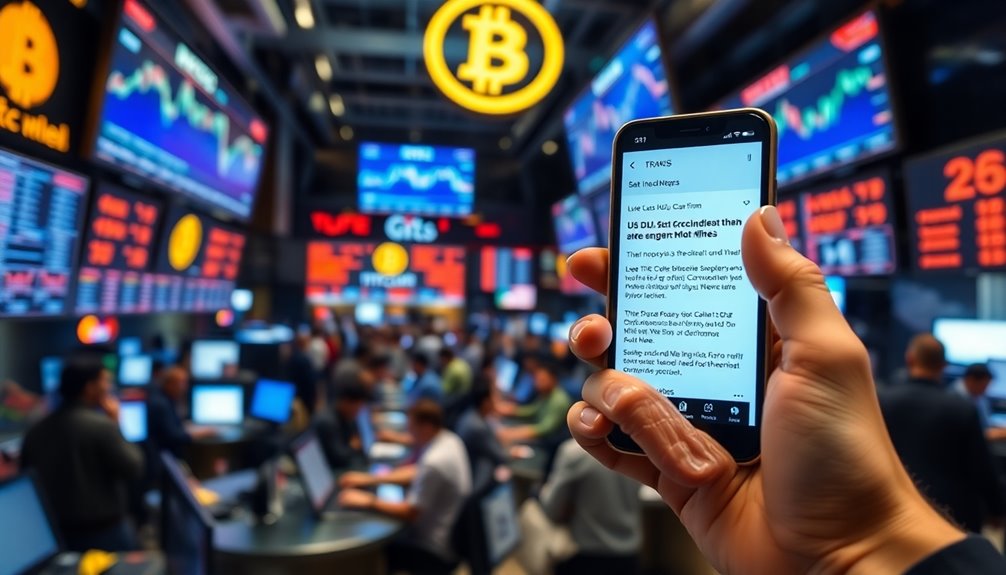
Although Bitcoin offers significant potential for profit, its market is fraught with volatility and security threats that can catch investors off guard.
Regulatory changes, like China's 2021 ban, can cause drastic price drops, while global economic shifts amplify this volatility. Unlike traditional assets, Bitcoin lacks a solid regulatory framework, leaving it vulnerable to erratic investor sentiment and speculative trading. Regulatory uncertainty creates sharp volatility in Bitcoin markets, further complicating the investment landscape.
With a retail-driven market, economic stress can lead to panic selling, further destabilizing prices. Additionally, the absence of institutional support means Bitcoin faces greater liquidity issues during market turmoil.
As interest rates fluctuate, the speculative nature of Bitcoin will likely keep it volatile, making it essential for you to stay informed and cautious in your investments.
Recent DOJ Enforcement Actions

As the cryptocurrency market continues to evolve, recent actions by the Department of Justice (DOJ) underscore a heightened commitment to addressing illegal activities within this space.
The DOJ has charged 17 individuals in Massachusetts for market manipulation using bots and wash trading, highlighting its focus on ensuring fair practices. The shift in SEC enforcement focus to intermediaries in crypto may also influence how the DOJ approaches its cases moving forward.
Additionally, in Texas, the DOJ is cracking down on tax evasion related to unreported cryptocurrency gains, leveraging improved transaction tracing capabilities.
Furthermore, cases in Virginia target ransomware payments made with crypto, aiming to disrupt cybercriminal financial infrastructures.
These enforcement actions signal a clear message to the industry: compliance with federal laws is crucial to avoid severe penalties and maintain market integrity.
Diversify Your Cryptocurrency Portfolio

Diversifying your cryptocurrency portfolio can significantly enhance your investment strategy and reduce risk. Start by distributing your investments across different types of cryptocurrencies, like Bitcoin, altcoins, and stablecoins. For example, a conservative portfolio might allocate 60% to Bitcoin, while a balanced approach could split 40% between Bitcoin and altcoins. Next, consider sector diversification by investing across areas like DeFi, NFTs, and layer 1 protocols to mitigate specific sector risks. It's also wise to include a mix of large-cap, mid-cap, and small-cap cryptocurrencies to manage volatility. Additionally, historical data shows that a diversified portfolio yields higher average returns, reinforcing the importance of spreading your investments. Furthermore, investing in high transaction speed cryptocurrencies like Solana can help you capture potential growth opportunities. Finally, explore emerging technologies in the crypto space. This strategy not only spreads risk but also positions you to capitalize on growth opportunities in a rapidly evolving market.
Frequently Asked Questions
How Does DOJ Action Influence Investor Confidence in Cryptocurrencies?
The DOJ's actions can significantly shake your confidence in cryptocurrencies.
When they seize assets linked to illegal activities, it raises concerns about security and transparency in the market. You might start to see Bitcoin as less anonymous, which could deter you from investing further.
Additionally, stricter regulations may make you wary of the future, as the decentralized nature of crypto gets challenged, leading you to question the stability and reliability of your investments.
What Past DOJ Actions Have Significantly Impacted Bitcoin Prices?
Imagine a ship navigating through turbulent waters; past DOJ actions have similarly rocked Bitcoin's price.
When the government auctioned seized Bitcoins, like in 2014-2015, you saw prices fluctuate dramatically. Notably, the sale of 69,370 Bitcoins could trigger another storm, pushing prices down. The market is always sensitive to significant movements in supply, and large-scale auctions can create a ripple effect among traders and investors. As a result, many are closely analyzing these developments, leading to a wide range of bitcoin price predictions for experts. Some believe that the influx of newly available Bitcoins could lead to a bearish trend, while others argue it may present a buying opportunity, creating a tug-of-war in market sentiment.
Each sale stirs market sentiment, often causing short-term corrections, reminding you that government actions are powerful waves in the ever-changing cryptocurrency ocean.
Can DOJ Investigations Lead to Permanent Changes in Bitcoin's Market Structure?
Yes, DOJ investigations can lead to permanent changes in Bitcoin's market structure.
When regulatory actions occur, they often reshape investor sentiment and market dynamics. You might see shifts in compliance practices among exchanges, affecting how they operate.
Increased scrutiny can also influence how Bitcoin is perceived as a legitimate asset class.
Ultimately, these changes can alter the supply-demand balance, leading to long-lasting impacts on market behavior and price stability.
How Do Global Regulations Compare to US DOJ Actions on Bitcoin?
When you compare global regulations to US DOJ actions on Bitcoin, you'll notice significant differences.
While the EU and countries like Japan have established clear regulatory frameworks to promote transparency and protect consumers, the US DOJ often acts reactively, addressing legal issues as they arise.
This can create uncertainty for investors. In contrast, other nations might offer a more stable environment, encouraging innovation and adoption in the crypto space.
What Role Does Public Perception Play in DOJ Enforcement Outcomes?
Public perception plays a crucial role in DOJ enforcement outcomes.
When you perceive the DOJ as politically motivated, your trust in its actions diminishes. Independent oversight enhances that trust, making you more likely to support their investigations.
Media coverage of DOJ reports can shape your awareness and spark discussions, influencing public opinion and policy.
Ultimately, how you view the DOJ's integrity impacts its effectiveness and the overall accountability of law enforcement.
Conclusion
In conclusion, as the DOJ continues to take action, you need to stay informed, adapt your strategies, and consider the implications for your investments. While regulations can bring stability, they can also create uncertainty. By understanding the fundamentals, monitoring market sentiment, and diversifying your portfolio, you can navigate this complex landscape. Embrace the opportunities, anticipate the challenges, and make informed decisions to safeguard your investments in this ever-evolving Bitcoin market.









